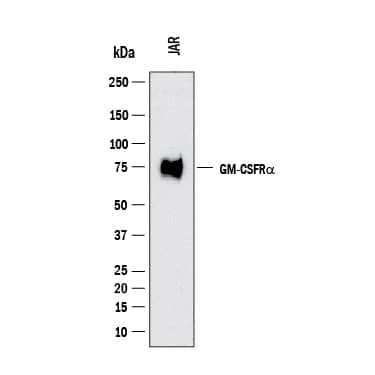Human GM-CSF R alpha Antibody
R&D Systems, part of Bio-Techne | Catalog # MAB11447

Key Product Details
Species Reactivity
Applications
Label
Antibody Source
Product Specifications
Immunogen
Met1-Gly320
Accession # P15509
Specificity
Clonality
Host
Isotype
Scientific Data Images for Human GM-CSF R alpha Antibody
Detection of Human GM-CSF R alpha by Western Blot.
Western blot shows lysates of JAR human choriocarcinoma cells. PVDF membrane was probed with 2 µg/mL of Mouse Anti-Human GM-CSF R alpha Monoclonal Antibody (Catalog # MAB11447) followed by HRP-conjugated Anti-Mouse IgG Secondary Antibody (Catalog # HAF018). A specific band was detected for GM-CSF R alpha at approximately 80 kDa (as indicated). This experiment was conducted under reducing conditions and using Western Blot Buffer Group 1.Applications for Human GM-CSF R alpha Antibody
Western Blot
Sample: JAR human choriocarcinoma cells
Formulation, Preparation, and Storage
Purification
Reconstitution
Formulation
Shipping
Stability & Storage
- 12 months from date of receipt, -20 to -70 °C as supplied.
- 1 month, 2 to 8 °C under sterile conditions after reconstitution.
- 6 months, -20 to -70 °C under sterile conditions after reconstitution.
Background: GM-CSF R alpha
Granulocyte macrophage colony stimulating factor receptor alpha (GM-CSF R alpha), also known as CD116, is a component of the receptor complex that mediates cellular responses to GM-CSF. GM-CSF promotes the differentiation and mobilization of granulocyte-macrophage, erythroid, megakaryocyte, and eosinophil progenitors. It enhances the activation of myeloid cell effector functions and plays a role in the development of Th1 biased immune responses, allergic inflammation, and autoimmunity (1‑4). Mature human GM-CSF R alpha is an 80 kDa type I transmembrane glycoprotein that consists of a 298 amino acid (aa) extracellular domain (ECD) with two fibronectin type III domains and a juxtamembrane WSxWS motif, a 26 aa transmembrane segment, and a 54 aa cytoplasmic domain (5). Within the ECD, human GM-CSF R alpha shares approximately 33% aa sequence identity with mouse and rat GM-CSF R alpha. Alternative splicing of human GM-CSF R alpha generates several additional isoforms that lack the cytoplasmic and/or transmembrane regions. Soluble forms of the receptor retain the ability to bind GM-CSF (6, 7). GM-CSF R alpha is expressed on hematopoietic stem cells, progenitor and differentiated cells in the myeloid lineage, vascular endothelial cells, placenta, and non-hematopoietic solid tumor cells (8). GM-CSF R alpha associates with the common beta chain/CD131 ( betac), a 135 kDa transmembrane protein that is also the signal transducing component of the receptors for IL-3 and IL-5 (9, 10). Association with betac converts GM-CSF R alpha from a low affinity to a high affinity receptor for GM-CSF (9‑11). The shared usage of betac underlies the synergism between GM-CSF, IL-3, and IL-5 in their effects on myeloid cell differentiation and activation (1, 2).
References
- Martinez-Moczygemba, M. and D.P. Huston (2003) J. Allergy Clin. Immunol. 112:653.
- Fleetwood, A.J. et al. (2005) Crit. Rev. Immunol. 25:405.
- Eksioglu, E.A. et al. (2007) Exp. Hematol. 35:1163.
- Cao, Y. (2007) J. Clin. Invest. 117:2362.
- Gearing, D.P. et al. (1989) EMBO J. 8:3667.
- Pelley, J.L. et al. (2007) Exp. Hematol. 35:1483.
- Raines, M.A. et al. (1991) Proc. Natl. Acad. Sci. USA 88:8203.
- Chiba, S. et al. (1990) Cell Regul. 1:327.
- Kitamura, T. et al. (1991) Proc. Natl. Acad. Sci. USA 88:5082.
- Hayashida, K. et al. (1990) Proc. Natl. Acad. Sci. USA 87:9655.
- Hoang, T. et al. (1993) J. Biol. Chem. 268:11881.
Long Name
Alternate Names
Gene Symbol
UniProt
Additional GM-CSF R alpha Products
Product Documents for Human GM-CSF R alpha Antibody
Product Specific Notices for Human GM-CSF R alpha Antibody
For research use only
